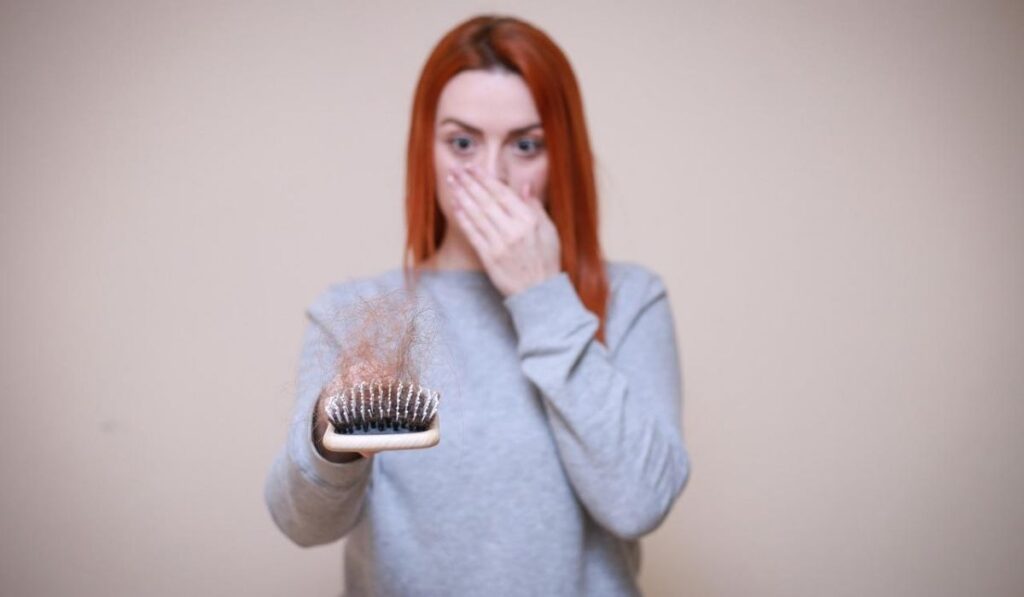Have you been noticing that you’re losing much hair lately? If you’ve been, you may be experiencing chronic stress.

POST CONTENTS
Chronic Stress
Did you know that 13% or 2.4 million Australians of legal age and over suffer from chronic stress? Chronic stress is the experience of a prolonged and constant sense of stress that can affect one’s physical health negatively. It is usually caused by daily pressures from work, family, or past traumas. It takes place when the body experiences stressors frequently and consistently that the body’s autonomic nervous system no longer gets to activate its relaxation response. When one is in constant stress, one’s body is always in a state of physiological arousal. This should never be the case as all parts of the body will be negatively affected. So much so that it can even lead to hair loss.
ALSO READ: 7 Health Tips To Beat Mental Stress & Improve Mood
Symptoms of Chronic Stress
Apart from hair loss, you may also be experiencing chronic stress if you have the following symptoms:
- Low energy
- Disturbed sleep pattern
- Aches and pains
- Fatigue
- Disorganized thinking
- Sense of helplessness
- Sense of loss of control
- Frequent infections and illnesses
- Irritability
- Headaches
- Difficulty concentrating
- Nervousness
- Muscle tension
- Upset stomach
- Anxiety
Can Anxiety Also Cause Hair Loss?
Apart from chronic stress, major anxiety can also cause hair loss. The conditions are linked as anxiety can be a symptom of chronic stress.
What Other Conditions Can Cause Hair Loss?
The following conditions can cause hair loss:
Trichotillomania
Trichotillomania is a psychological condition where a person pulls out their hair from different parts of their body whenever they experience stress, anxiety, and negative emotions. This psychological condition is most common in teenage girls.
Telogen Effluvium
Telogen effluvium is a situation where a person’s hair follicles enter a resting phase and stop producing new hair strands. This can lead to easy hair fallout even if a person is just touching, combing, or washing their hair. This condition can be due to changes in one’s hormone levels or poor nutrition. One can suffer from hair loss if one’s diet is lacking in the following nutrients:
- Vitamins A, C, D, and E
- B vitamins, also known as biotin
- Zinc
- Iron
- Protein
Alopecia areata
A person has alopecia areata when their immune system attacks their hair follicles. This leads to hair falling out. Alopecia areata can also manifest when one develops thinner hair or bald spots. With this condition, hair is still able to regrow. It is just that it tends to fall out over time. Medical experts still cannot exactly pin down what exactly causes this condition. But research shows that it is highly likely caused by one’s genes. Alopecia areata is not caused by stress. Dealing with it can be stressful though.
If you want to rid yourself of the emotional baggage of having to worry about how your hair looks, you could consider giving SMP a try. SMP stands for scalp micro-pigmentation. It is a non-invasive procedure that can make your hair look thick and healthy.
Check out the services of Luxe Micro. Luxe Micro is an outstanding SMP clinic in Melbourne that is trusted by many.
6 Ways to Cope with Stress and Hair Loss
There is always something that you could do about hair loss. The following are ones that you could easily do now:
Careful hair care
You should take time to properly care for your hair. Know the proper way to wash, dry, and style it. Often, it simply is one’s lack of hair care that causes hair loss. Start by waiting for your hair to dry before combing it. Combing wet hair is extremely damaging not just to your hair but to your scalp as well.
Regular physical activity
Maintain a regular exercise schedule. It does not have to be strenuous and intense. Any regular physical activity would do so long as it regularly releases endorphins or happy hormones. Stress cannot stay for long inside an active body.
Routine relaxation practices
Relaxation should always be a part of your daily routine. It should never be done just when you have free time. You should go out of your way to carve time for it. Consider practising meditation, journaling, or yoga.
Socialization
Isolation is never the solution to stress. Isolation can even make it worse. To combat this, make an effort to schedule time for interaction with family and friends.
Healthy diet
Go out of your way to plan a diet that will boost the health of your hair. Eat foods rich in hair-health boosting nutrients like papaya, almonds, broccoli, carrots, pumpkin, raisins, sesame seeds, kale, cucumbers, Brazil nuts, collard green, dried apricots, bananas, sweet potatoes, strawberries, salmon, and egg.
Professional help
You can also schedule a visit to a therapist. Chronic stress manifests physically but it is ultimately a mental health concern. Working with a professional will allow you to clinically assess your current mental state and capacity. A professional will allow you to determine your stressors in a precise and clinical way. You will be taught ways and means to cope with your internal world to allow for a peaceful, calm, and relaxed internal world.
Reference:
Stress and trauma – Australian Institute of Health and Welfare: https://www.aihw.gov.au/reports/australias-health/stress-and-trauma
